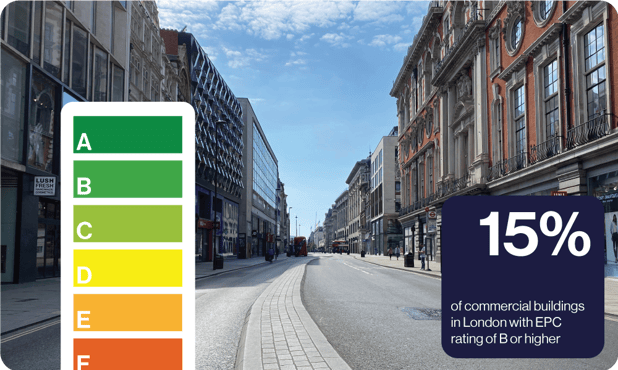Rishi Sunak announced on the 20th September that residential landlords and homeowners will no longer be forced to upgrade the energy efficiency of homes. As yet there has been no mention of commercial buildings and therefore there is a continuing issue for landlords and tenants alike for new leases, assignments and underlettings.

To recap on the latest MEES (Minimum Energy Efficiency Standards) legislation, as of April this year office buildings must have a minimum EPC Rating (Energy Performance Certificate) of ‘E’ in order to be let. Although not confirmed and subject to further legislation the government propose a minimum EPC ‘B’ in 2030. What is not clear and subject to ongoing consultation in the meantime is the timing of moving to a ‘C’ rating for which 2027 was widely expected however there are doubts now in terms of what has been dubbed as a ‘U’ turn on the road to net zero by 2050.
There is no doubt that global warming needs to be tackled and MEES and EPCs are an effective means of addressing it.
It is estimated that the real estate sector is responsible for approximately 40% of the UK’s greenhouse gas emissions. Only 15% of commercial buildings in London currently carry a ‘B’ rating and nationally it is estimated that something approaching 20% of existing office buildings do not have an EPC rating of ‘E’ or better and would therefore not be eligible to be let.
The ongoing government legislation is well meaning however clarity is much needed. The government did not fully consider the wide ranging repercussions of the Brexit aftermath which has created many continuing unforeseen issues for UK businesses. In a similar way uncertainty over MEES legislation carries serious risks and poses many potential problems as explained in the following hypothetical example:
- A landlord grants a new 10 year lease on a building with an ‘E’ rating this year with a ‘tenant only’ break at the 5th If the tenant decides to assign their lease or underlet in the first 5 years they will still be able to do so as the premises with have the correct EPC rating until potentially 2027, furthermore they are to a degree protected by their option to break the lease in the 5th year, 2028. The real problem arises if they do not break their lease and want to assign or underlet beyond the break date in 2028 when the minimum rating may potentially have risen to ‘C’ by then. Not only would they not be able to let the premises legally but who is liable and who pays the bill for complying and raising the EPC rating so that the premises are able to be marketed, Landlord or tenant? The statutory obligation to comply with MEES is imposed on the property owner rather than the tenant although in a few cases this sits with the tenant if commercially agreed and included in the lease.
- The regulations also state an exemption if “the cost of the improvement would not pay for itself over a 7 year period” – so how would they practically apply to a tenant disposing of a lease of less than 7 years?
Further complications arise in terms of landlords, if required, entering the premises to undertake improvement works in order for the premises to comply. Clearly the situation gets worse for new leases granted form next year and every year thereafter until 2030 although these dates may well now be altered.
Clarity is clearly needed however as the tin has now been kicked down the road the answers will probably only come after the next election.
No Comments Yet
Let us know what you think